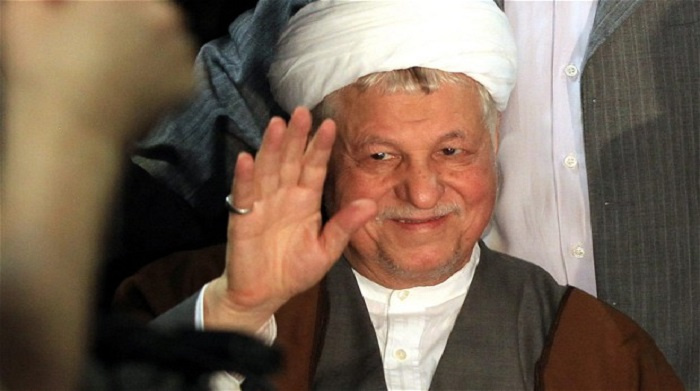Rafsanjani’s Obscure Intentions in Face-Off with Guardian Council

Hessam Emami
Iran’s former president Akbar Hashemi Rafsanjani has bitterly slammed the Guardian Council’s decision to bar Hassan Khomeini, a grandson of the Islamic Republic’s founder, from running for a seat in the country’s Assembly of Experts, a top clerical body that will be in charge of choosing the Supreme Leader’s successor, in case need be.
Rafsanjani singled out the disqualification of a person ‘most resembling’ Ayatollah Khomeini in remarks made on the anniversary of the late Iranian Supreme Leader’s return to the country in 1979 after 14 years of exile,here in Tehran on Monday.His speech at former Supreme Leader Ruhollah Khomeini’s mausoleum come as a rare outspoken challenge to the Guardian Council.
“Where did you get your own qualification from? Who has given you the permission to judge? Who has permitted you to just sit and arbitrate? Who has allowed you to control the Majlis, the administration, and other positions of power? Who has allowed you to have weapons and podiums [at the same time]? Who has given you the permission to have Friday prayer podiums and the state TV [at the same time]? Who has bestowed all these on you?”
Although out of context these remarks could be interpreted as more harshly suggestive innuendos, Hashemi Rafsanjani continued his remarks by stating that all the Islamic Republic’s officials are “indebted to Imam Khomeini”, in an attempt to further his defense of the young Khomeini. Rafsanjani said, “If it was not for Imam Khomeini, his movement and public will, none of these could be at hand,” he added. “At a time when we should all be congratulating each other, they gave a bad gift to Imam’s household,” he said in reference to the expectations for a more open domestic atmosphere following the implementation of the JCPOA.
Elsewhere in his remarks, he openly expressed raising concerns over an increasing monopolized power system and a widening rift among top politicians in the past decade, which he said he believed would harm national interests in the long run.
Rafsanjani’s harsh tone has come under fire from conservative media. Soon after Rafsanjani’s remarks, Nasim Online published unconfirmed reports that the conservative Combatant Clergy Association would eliminate Rafsanjani’s name from their nominee shortlist because of the comments. In response to Rafsanjani’s remarks about a nationwide ‘debt to the Imam’, an article published in Javan Online, linked to the Islamic Revolutionary Guard Corps, wrote that no one is indebted to Ayatollah Khomeini or his household when it comes to the law. “If anyone is indeed indebted to Ayatollah Khomeini, it is Rafsanjani and Khomeini’s household,” it continued. Kayhan, a conservative newspaper affiliated with the Supreme Leader, posted “Attack on Imam’s path covered as defense of Imam’s household” as its headline on Tuesday. Hossein Shariatmadari, Kayhan’s editor, argued that Rafsanjani’s criticism was motivated by his recognition that he would not be, against his wish, able to control the Assembly of Experts by filling the important body with his own allies. Siasate Rouz also labeled the remarks as “Hashemi’s attack on Imam’s legacy”.
Hashemi Rafsanjani’s fray with the Guardian Council was first public when the council barred him from running for president two years ago by a heretical age limit. However, Rafsanjani snatched victory from the jaws of defeat by backing Hassan Rouhani in the last minute. The recent episode however does not personally concern him. He has been qualified to run for the Assembly of Experts in which the age limit cannot apply as members are supposed to be senior religious scholars and have no executive duties.
Hashemi Rafsanjani admitted in his remarks he has no influence in the decision-making spheres to press for reconsiderations in the electoral vetting process. Everyone familiar with the dynamic of the political system in Iran knows that such heated criticisms of the Guardian Council can boomerang and Rafsanjani knows better than anyone that his remarks will weaken the reformist camp more than ever. Some reformists have already slammed his remarks to keep their camp clean from accusations of opposing the establishment. On the other hand, the principlists are sarcastically suggesting that he should quit the electoral race in defense of Hassan Khomeini. Hardliners are seriously asking the Guardian Council to disqualify Rafsanjani over the remarks. Is he burning the candle of his remaining influence and legitimacy on both ends or are his remarks set to stir a controversy that will result in a more competitive election? Could his remarks be considered as a victimization of Hassan Khomeini to collect his potential votes for Hashemi Rafsanjani, as most principlists tend to say? Or did he just introduce the young Khomeini as a political player with significant prospects?

